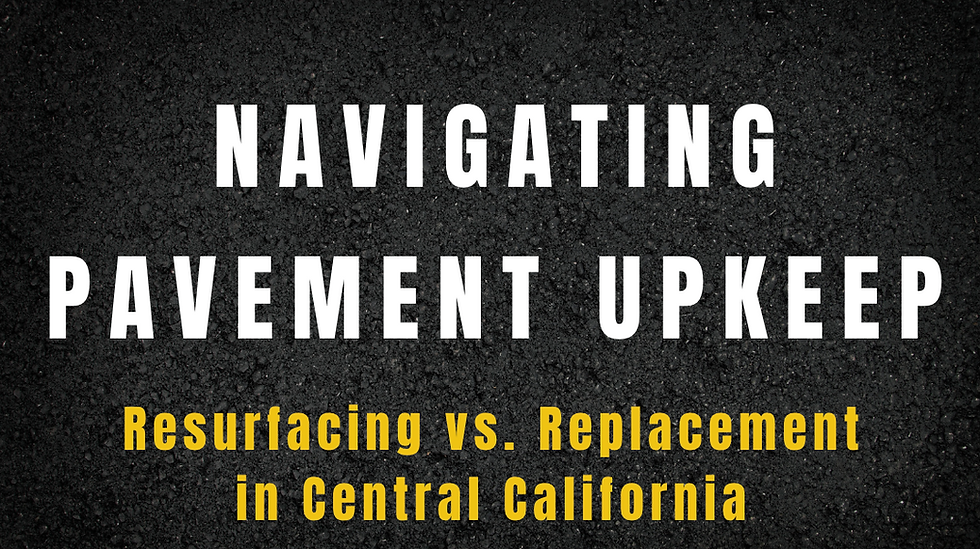Concrete or Asphalt: Choosing the Right Surface for Your Commercial Lot
- Central Coast Paving
- Feb 6, 2024
- 2 min read

Introduction
When it comes to commercial lot paving, the debate between concrete and asphalt is ongoing. In Central California, with its varied climate and bustling commercial activity, selecting the right paving material is crucial for any business owner. Both concrete and asphalt have their advantages and potential drawbacks, and the best choice often depends on specific project requirements and local conditions. As pavement specialists, we're here to shed light on this topic and guide you through making the best decision for your commercial lot.
Concrete: The Sturdy and Stylish Choice
Concrete is known for its durability and low maintenance. It's resistant to high temperatures, making it less likely to soften in the heat of Central California's inland areas. It also offers a clean, bright appearance that can enhance the professional look of a commercial property.
Pros:
Longevity: Concrete can last up to 40 years with proper maintenance.
Load-bearing capacity: Ideal for heavy-loaded vehicles and high-traffic areas.
Reflective surface: Reduces the need for lighting at night, saving on electricity costs.
Cons:
Higher upfront costs: Concrete is typically more expensive to install than asphalt.
Longer curing time: It may take up to a week before a concrete lot can be used.
Stain visibility: Oil and tire marks are more noticeable on concrete.
Asphalt: The Flexible and Economical Path
Asphalt is a popular choice for commercial lots due to its lower initial cost and faster installation time. Its flexibility makes it less susceptible to cracking from the ground movement, which can be a plus in areas with shifting soil conditions.
Pros:
Cost-effective: Less expensive to install and can be used sooner after laying.
Smooth finish: Provides a sleek appearance and a quiet ride.
Easy to repair: Damages can often be patched without redoing the entire surface.
Cons:
Shorter lifespan: Typically lasts around 20 years before a full replacement is needed.
Maintenance: Requires regular sealing to maintain its condition and appearance.
Heat sensitivity: Can become soft in extreme heat, potentially leading to ruts and grooves.
Site-Specific Considerations for Central California
Climate Impact: Central California's climate varies from coastal to inland regions. Asphalt might be the better choice in cooler coastal areas, while concrete may perform better in the intense heat of the valley.
Traffic Patterns: For lots with heavy or industrial traffic, concrete's durability may offer a longer-term benefit, while asphalt might suffice for lighter traffic conditions.
Environmental Responsibility: If sustainability is a priority, concrete's reflectivity reduces light pollution and its longevity means less frequent replacement. However, asphalt is 100% recyclable, which could tip the scales for eco-conscious businesses.
Conclusion
The choice between concrete and asphalt for commercial lots in Central California is nuanced. It's essential to weigh the initial investment against long-term value, considering the specific use-case scenarios for your commercial lot. Partnering with a pavement specialist can help you navigate these decisions, ensuring that you choose the right material for your project's needs.
Are you planning to pave a commercial lot and need expert advice on the best material for your project? Contact Central Coast Paving, Central California’s premier pavement specialists, for a consultation that will set your commercial lot up for years of success. Call us at (805) 665-3292 to get started.




Comments